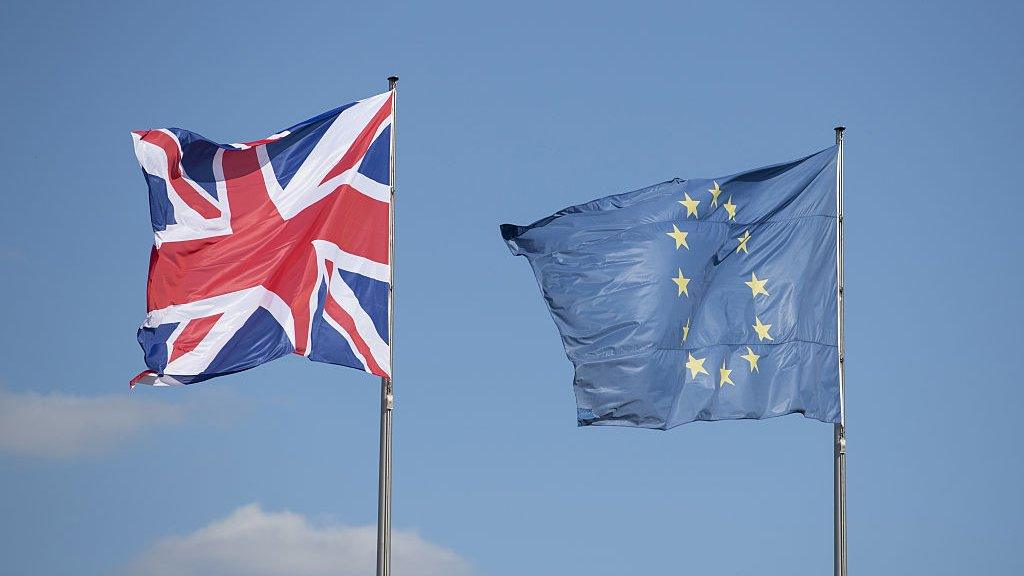Brexit: Business and industry react to May's speech
- Published
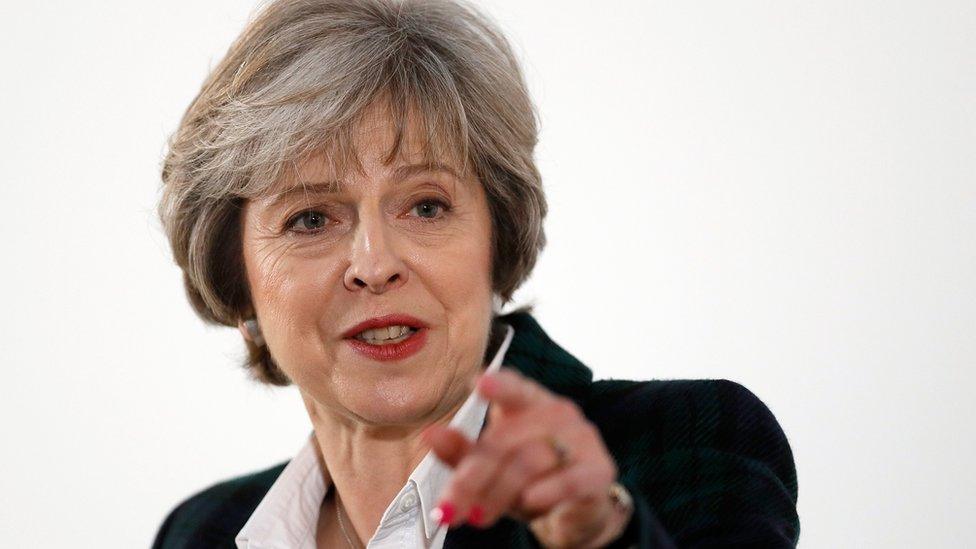
Theresa May's Brexit speech was broadly welcomed by UK business and finance for adding clarity.
But the widespread reaction was that it's the final detail of the EU exit terms that matter, not laying out the direction of travel. Here are some responses from business leaders.

Adam Marshall, director general, British Chambers of Commerce:
"In business, what you achieve in a negotiation - not what you bid for - is what really matters. The Brexit process is no different. While businesses now have a clearer sense of the prime minister's top-line priorities, they will come away from her speech knowing little more about the likely outcome of the Brexit negotiations than they did yesterday.
"The simple fact is that businesses all across the UK are carrying on. Directly-affected companies are being pragmatic, and are preparing for a range of possible outcomes. Away from Westminster, many businesses are ignoring the Brexit 'noise' completely, and say there needs to be a far bigger focus on getting the basics right here at home."

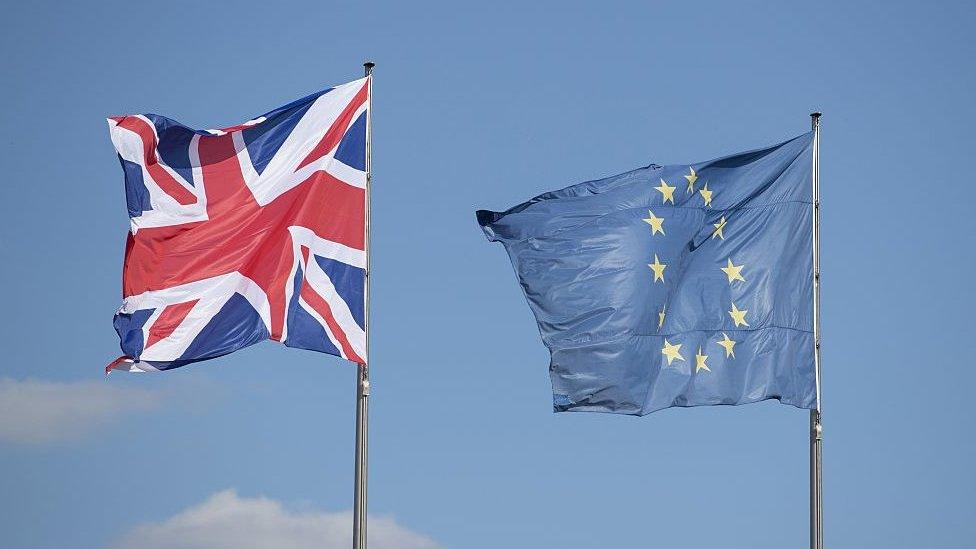
Ann Francke, chief executive, Chartered Management Institute:
"Nearly half of managers (49%) believe that Brexit will have a negative impact on economic growth, so it's imperative that we act now if we want UK business to remain dynamic and resilient.
"With the prime minister signalling today that the UK will make a clean break from the EU, it is inevitable that the number of foreign workers coming to the UK will fall after Brexit, so we need to invest heavily in home grown talent now to ensure that we have the skilled workers capable of plugging the gaps."

Lord Bamford, chairman, JCB construction firm
"I am very encouraged by the vision set out by the prime minister today. The UK voted to leave the European Union and she is determined to make this happen in a way that restores our sovereignty but which ensures the UK becomes a global leader in free trade.
"British business now needs to get behind the government as it sets out to secure the best deal for our country's future. As the prime minister said, we are leaving the EU but we are not leaving Europe - it will remain an important market for British business but we need to be able to trade freely with the rest of the world as well."

Dame Inga Beale, chief executive, Lloyd's of London insurance market
"While we have got some more certainty about where the government is heading on this, for us it doesn't make a difference, we are still going to go ahead with our plans to open a subsidiary [inside the EU].
"What we need is the licensing and the regulatory ability to be able to provide insurance to the EU customers that we have. Without access to the single market we are not going to be able to continue to do that for some of our business from London as we have done, traditionally, for many years."
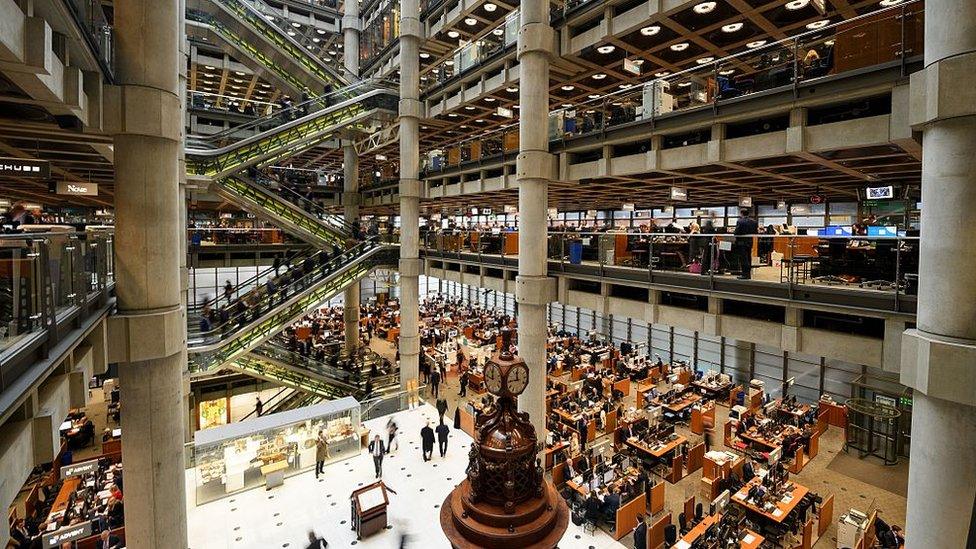

Paul Everitt, chief executive, ADS aerospace and defence trade body:
"The Prime Minister has provided important clarity ahead of the triggering of Article 50 and the start of formal Brexit negotiations. ADS will continue to support government as it seeks to secure an ambitious agreement with our EU partners that delivers barrier-free access to trade, skills and simplified regulatory regimes.
"Securing the best deal for the UK and our EU partners will take time and it is essential that there are transitional arrangements in place to avoid disrupting closely integrated supply chains and damaging the UK's global competitiveness."

Carolyn Fairbairn, director-general, CBI:
"Today the prime minister changed the landscape. Ruling out membership of the Single Market has reduced options for maintaining a barrier-free trading relationship between the UK and the EU. But businesses will welcome the greater clarity and the ambition to create a more prosperous, open and global Britain, with the freest possible trade between the UK and the EU.
"The pressure is now on to deliver these objectives and achieve a smooth and orderly exit. Businesses want to make a success of Brexit but will be concerned about falling back on damaging WTO rules."
Some of the headlines from Theresa May's vision for future UK-EU relations

Prof Kevin Dowd, member of Economists for Brexit:
"We strongly welcome Theresa May's announcement that the UK will leave the Single Market and will not participate in the customs union in its current form. Leaving this protectionist union is the only way for the UK to maximise the economic benefits of leaving the EU, which, through the right policies, we estimate will deliver a 4% GDP Brexit dividend and will lead to consumer prices falling by 8%.
"In order to deliver this maximum economic benefit, it is crucial that the UK achieves a position of tariff free trade across the world as swiftly as possible, whilst avoiding a tit-for-tat tariff war with the EU which will harm consumers and postpone Brexit's economic benefits."

Terry Scuoler, chief executive, EEF manufacturers' organisation:
"In order for the government to lay the foundations of a globally competitive Britain, it must bring forward a clear and far-reaching industrial strategy that will enable businesses to seize the many expected opportunities the prime minister believes will arise after we leave the EU.
"In the end it's the detail of the final agreement that will matter and it is important that this will be open to parliamentary scrutiny. Parliament and business will want to see a very clear, evidence-based plan to ensure the UK economy avoids collateral damage arising from our departure."

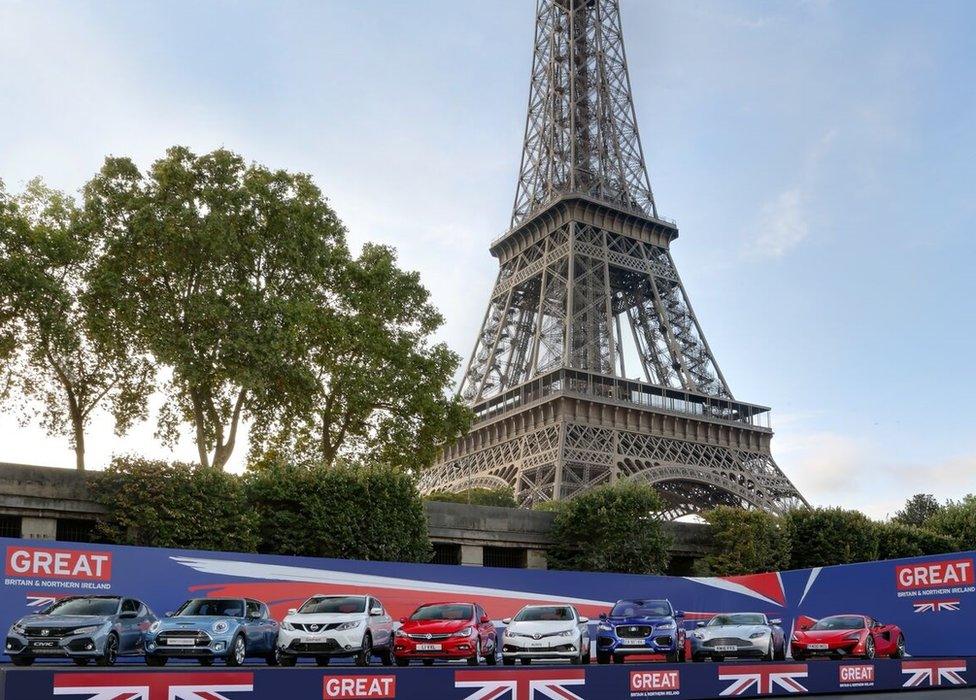
Mike Hawes, chief executive, SMMT car industry body:
"The recognition by the prime minister of the importance of single market arrangements for the automotive sector is critical. We need government to deliver a deal which includes participation in the customs union to help safeguard EU trade, trade that is tariff-free and avoids the non-tariff and regulatory barriers that would jeopardise investment, growth and consumer choice.
"Achieving this will not be easy and we must, at all costs, avoid a cliff-edge and reversion to WTO tariffs, which would threaten the viability of the industry."

Danny McCoy, chief executive, Ibec Irish business trade group:
"This is an aggressive move by the UK, showing little regard for our trading relationship and for relations with other EU member states. Theresa May has signalled a change to the UK business model, away from a collective European rules-based approach, towards a more nationalistic, isolated stance.
"This is likely to lead to a protracted and unwelcome period of uncertainty and instability for business. Ireland is uniquely exposed to the risks given out deep economic ties with the UK."
- Published17 January 2017
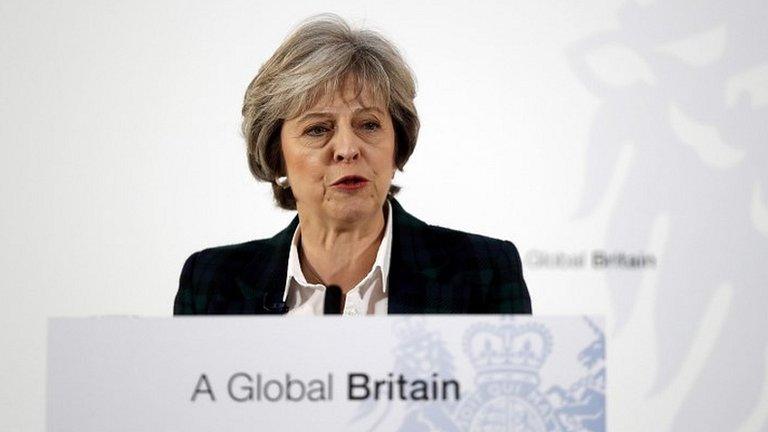
- Published17 January 2017
